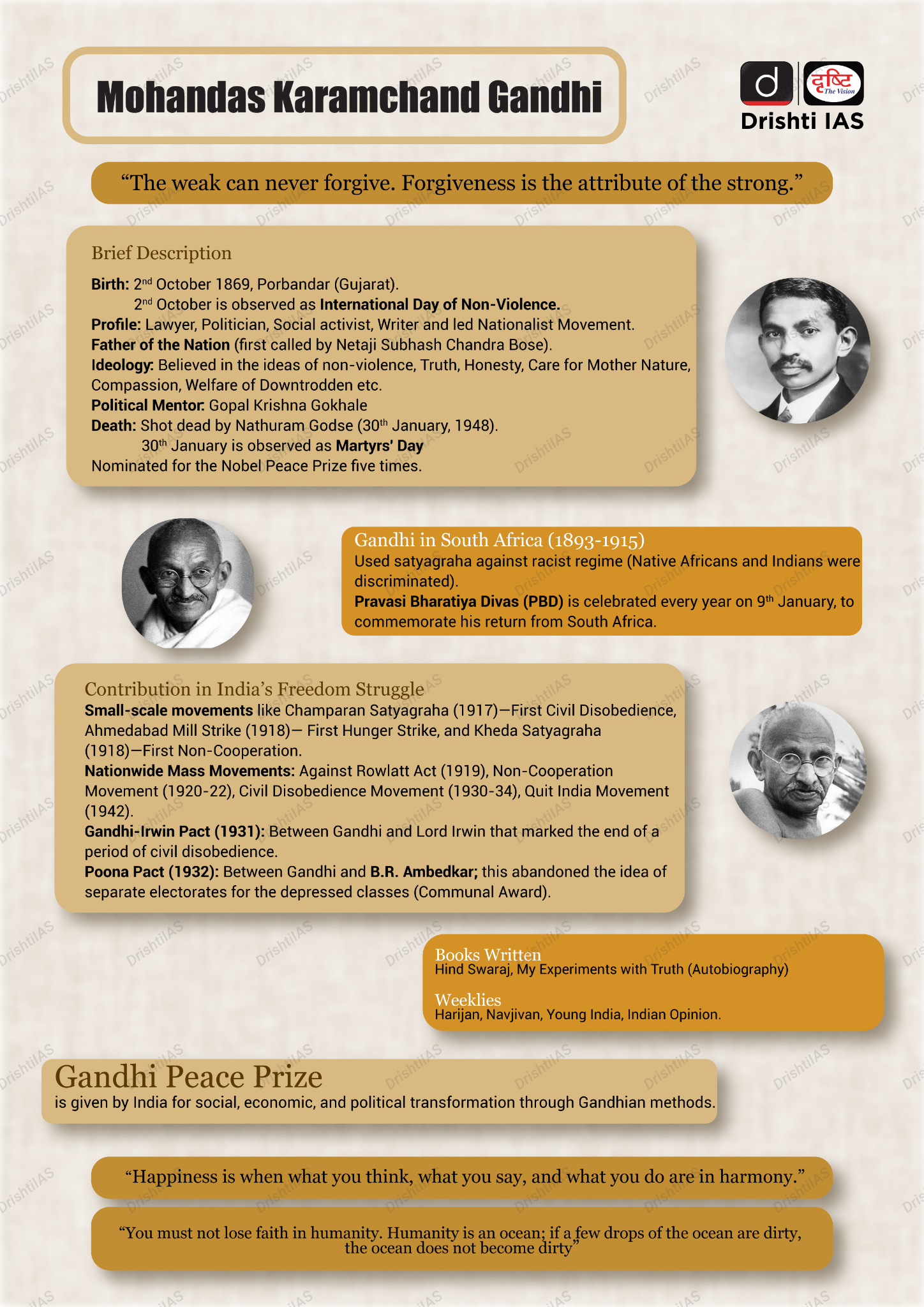Important Facts For Prelims
Sabarmati Ashram Redevelopment Project
- 15 Mar 2024
- 6 min read
Why in News?
Recently, on the 94th anniversary of the Dandi March, the Prime Minister of India laid the foundation for the Sabarmati Ashram Redevelopment Project in Ahmedabad.
- The Sabarmati Ashram Redevelopment Project is a Rs 1,200 crore initiative to restore, conserve, and rebuild the original Sabarmati Ashram founded by Mahatma Gandhi.
What is the Historical Significance of the Sabarmati Ashram?
- Establishment:
- Founded in 1917 by Mahatma Gandhi, the Sabarmati Ashram is situated on the western bank of the Sabarmati River, near the village of Juna Vadaj in Ahmedabad.
- Gandhi set up five settlements during his lifetime, two in South Africa (Phoenix Settlement in Natal, and Tolstoy Farm outside Johannesburg), and three in India.
- Gandhi’s first Ashram in India was established in the Kochrab area of Ahmedabad in 1915, and the others are Sabarmati Ashram (Ahmedabad), and Sevagram Ashram (in Wardha).
- It is currently managed by the Sabarmati Ashram Preservation and Memorial Trust (SAPMT).
- Founded in 1917 by Mahatma Gandhi, the Sabarmati Ashram is situated on the western bank of the Sabarmati River, near the village of Juna Vadaj in Ahmedabad.
- Role in India's Independence Movement:
- The ashram served as a base for Gandhi's socio-political activities and experiments with truth and non-violence.
- It witnessed the launch of several seminal movements, including the Dandi March in 1930.
- Apart from the Dandi March, Gandhiji also launched the Champaran Satyagraha (1917), the Ahmedabad mills strike and Kheda Satyagraha (1918), the Khadi movement (1918), the Rowlatt Act and Khilafat Movements (1919), and the Non-Cooperation movement (1920) while living in Sabarmati.
- Vinoba Bhave lived in a cottage at Sabarmati Ashram called "Vinoba Kutir".
- The ashram served as a base for Gandhi's socio-political activities and experiments with truth and non-violence.
- Architectural and Philosophical Significance:
- Gandhi designed the ashram himself, embodying simplicity, self-sufficiency, and communal living.
- Constructed using local materials and traditional techniques, the ashram exemplified Gandhi's principles of sustainability and harmony with nature.
- Legacy and Symbolism:
- The Sabarmati Ashram stands as a testament to Gandhi's enduring legacy and his pivotal role in India's freedom struggle.
- It remains a pilgrimage site for admirers of Gandhian philosophy, offering insights into his life, teachings, and principles.
What is the Dandi March?
- Origins:
- The tradition of making salt in India dates back to ancient times, primarily carried out by farmers, who were often referred to as salt farmers.
- Over time, salt became a commercial commodity, and the British imposed a salt tax, making it a symbol of colonial exploitation.
- Mahatma Gandhi recognized the salt tax as a particularly oppressive measure and saw it as an opportunity to mobilise the masses in a non-violent protest against British rule.
- On March 2, 1930, Mahatma Gandhi wrote a letter to Lord Irwin, the Viceroy of India, informing him of his intention to break the salt law as an act of civil disobedience.
- The Dandi March, also known as the Salt Satyagraha or Salt March, marked a pivotal moment in the country's fight for independence from British colonial rule.
- The tradition of making salt in India dates back to ancient times, primarily carried out by farmers, who were often referred to as salt farmers.
- Dandi March:
- The Dandi March commenced from the Sabarmati Ashram in Ahmedabad on March 12, 1930, with Mahatma Gandhi leading.
- The 24-day march spanned four districts and passed through 48 villages.
- On April 6, 1930, Gandhi symbolically broke the salt law by picking up a handful of salt from the shores of Dandi, starting the civil disobedience movement against the British salt monopoly.
- Gandhi chose 6 April to start the mass breaking of the salt laws for a symbolic reason - it was the first day of National Week, which began in 1919 when Gandhi planned the national hartal (strike) against the Rowlatt Act.
- The Dandi March commenced from the Sabarmati Ashram in Ahmedabad on March 12, 1930, with Mahatma Gandhi leading.
UPSC Civil Services Examination, Previous Year Question (PYQ)
Prelims
Q1. Who among the following is associated with ‘Songs from Prison’, a translation of ancient Indian religious lyrics in English? (2021)
(a) Bal Gangadhar Tilak
(b) Jawaharlal Nehru
(c) Mohandas Karamchand Gandhi
(d) Sarojini Naidu
Ans: (c)
Q2. With reference to the British colonial rule in India, consider the following statements: (2019)
- Mahatma Gandhi was instrumental in the abolition of the system of ‘indentured labour’.
- In Lord Chelmsford’s ‘War Conference’, Mahatma Gandhi did not support the resolution on recruiting Indians for World War.
- Consequent upon the breaking of Salt Law by Indian people, the Indian National Congress was declared illegal by the colonial rulers.
Which of the statements given above are correct?
(a) 1 and 2 only
(b) 1 and 3 only
(c) 2 and 3 only
(d) 1, 2 and 3
Ans: (b)







